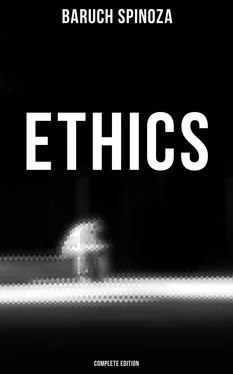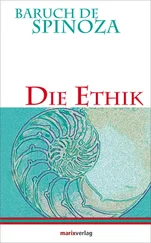Baruch Spinoza
Ethics
(Complete Edition)
Published by

Books
- Advanced Digital Solutions & High-Quality eBook Formatting -
musaicumbooks@okpublishing.info
2018 OK Publishing
ISBN 978-80-272-4753-0
Part I. Concerning God Part I. Concerning God Table of Contents
Part II. On the Nature and Origin of the Mind
Part III. On the Origin and Nature of the Emotions
Part IV. Of Human Bondage, or the Strength of the Emotions
Part V. Of the Power of the Understanding, or of Human Freedom
Table of Contents Table of Contents Part I. Concerning God Part I. Concerning God Table of Contents Part II. On the Nature and Origin of the Mind Part III. On the Origin and Nature of the Emotions Part IV. Of Human Bondage, or the Strength of the Emotions Part V. Of the Power of the Understanding, or of Human Freedom
I. By that which is self—caused, I mean that of which the essence involves existence, or that of which the nature is only conceivable as existent.
II. A thing is called finite after its kind, when it can be limited by another thing of the same nature; for instance, a body is called finite because we always conceive another greater body. So, also, a thought is limited by another thought, but a body is not limited by thought, nor a thought by body.
III. By substance, I mean that which is in itself, and is conceived through itself: in other words, that of which a conception can be formed independently of any other conception.
IV. By attribute, I mean that which the intellect perceives as constituting the essence of substance.
V. By mode, I mean the modifications 1 1. "Affectiones"
of substance, or that which exists in, and is conceived through, something other than itself.
VI. By God, I mean a being absolutely infinite—that is, a substance consisting in infinite attributes, of which each expresses eternal and infinite essentiality.
Explanation—I say absolutely infinite, not infinite after its kind: for, of a thing infinite only after its kind, infinite attributes may be denied; but that which is absolutely infinite, contains in its essence whatever expresses reality, and involves no negation.
VII. That thing is called free, which exists solely by the necessity of its own nature, and of which the action is determined by itself alone. On the other hand, that thing is necessary, or rather constrained, which is determined by something external to itself to a fixed and definite method of existence or action.
VIII. By eternity, I mean existence itself, in so far as it is conceived necessarily to follow solely from the definition of that which is eternal.
Explanation—Existence of this kind is conceived as an eternal truth, like the essence of a thing, and, therefore, cannot be explained by means of continuance or time, though continuance may be conceived without a beginning or end.
I. Everything which exists, exists either in itself or in something else.
II. That which cannot be conceived through anything else must be conceived through itself.
III. From a given definite cause an effect necessarily follows; and, on the other hand, if no definite cause be granted, it is impossible that an effect can follow.
IV. The knowledge of an effect depends on and involves the knowledge of a cause.
V. Things which have nothing in common cannot be understood, the one by means of the other; the conception of one does not involve the conception of the other.
VI. A true idea must correspond with its ideate or object.
VII. If a thing can be conceived as non—existing, its essence does not involve existence.
PROP. I. Substance is by nature prior to its modifications.
Proof.—This is clear from Deff. iii. and v.
PROP. II. Two substances, whose attributes are different, have nothing in common.
Proof.—Also evident from Def. iii. For each must exist in itself, and be conceived through itself; in other words, the conception of one does not imply the conception of the other.
PROP. III. Things which have nothing in common cannot be one the cause of the other.
Proof.—If they have nothing in common, it follows that one cannot be apprehended by means of the other (Ax. v.), and, therefore, one cannot be the cause of the other (Ax. iv.). Q.E.D.
PROP. IV. Two or more distinct things are distinguished one from the other, either by the difference of the attributes of the substances, or by the difference of their modifications.
Proof.—Everything which exists, exists either in itself or in something else (Ax. i.),—that is (by Deff. iii. and v.), nothing is granted in addition to the understanding, except substance and its modifications. Nothing is, therefore, given besides the understanding, by which several things may be distinguished one from the other, except the substances, or, in other words (see Ax. iv.), their attributes and modifications. Q.E.D.
PROP. V. There cannot exist in the universe two or more substances having the same nature or attribute.
Proof.—If several distinct substances be granted, they must be distinguished one from the other, either by the difference of their attributes, or by the difference of their modifications (Prop. iv.). If only by the difference of their attributes, it will be granted that there cannot be more than one with an identical attribute. If by the difference of their modifications—as substance is naturally prior to its modifications (Prop. i.),—it follows that setting the modifications aside, and considering substance in itself, that is truly, (Deff. iii. and vi.), there cannot be conceived one substance different from another,—that is (by Prop. iv.), there cannot be granted several substances, but one substance only. Q.E.D.
PROP. VI. One substance cannot be produced by another substance.
Proof.—It is impossible that there should be in the universe two substances with an identical attribute, i.e. which have anything common to them both (Prop. ii.), and, therefore (Prop. iii.), one cannot be the cause of the other, neither can one be produced by the other. Q.E.D.
Corollary.—Hence it follows that a substance cannot be produced by anything external to itself. For in the universe nothing is granted, save substances and their modifications (as appears from Ax. i. and Deff. iii. and v.). Now (by the last Prop.) substance cannot be produced by another substance, therefore it cannot be produced by anything external to itself. Q.E.D. This is shown still more readily by the absurdity of the contradictory. For, if substance be produced by an external cause, the knowledge of it would depend on the knowledge of its cause (Ax. iv.), and (by Def. iii.) it would itself not be substance.
PROP. VII. Existence belongs to the nature of substances.
Proof.—Substance cannot be produced by anything external (Corollary, Prop vi.), it must, therefore, be its own cause—that is, its essence necessarily involves existence, or existence belongs to its nature.
PROP. VIII. Every substance is necessarily infinite.
Proof.—There can only be one substance with an identical attribute, and existence follows from its nature (Prop. vii.); its nature, therefore, involves existence, either as finite or infinite. It does not exist as finite, for (by Def. ii.) it would then be limited by something else of the same kind, which would also necessarily exist (Prop. vii.); and there would be two substances with an identical attribute, which is absurd (Prop. v.). It therefore exists as infinite. Q.E.D.
Читать дальше













